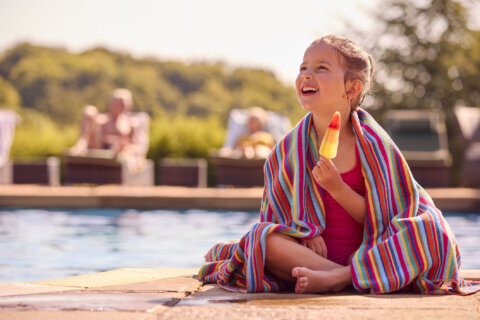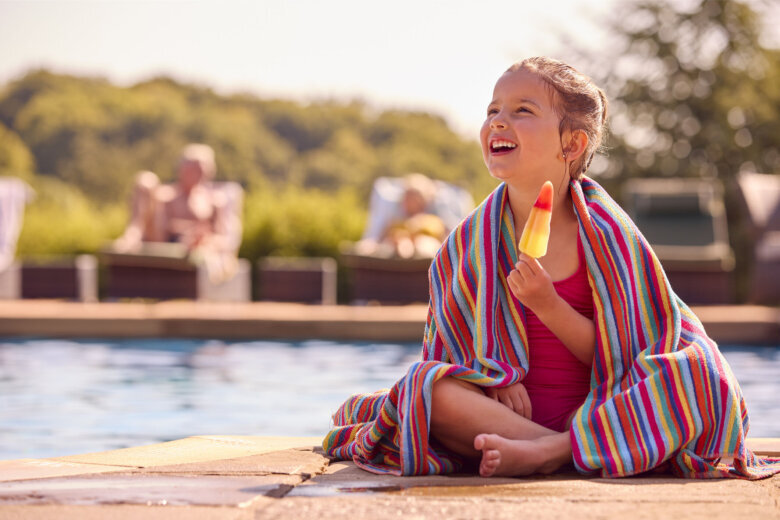
Summer is officially underway, and with summer comes a variety of health concerns: sun protection, hydration and heat, among others. Doing your best to stay healthy this summer – be it in the surf, sun or sand – is important. It’s also important to be able to parse through the many pieces of summer-health related advice that come with the season to make the best decisions for your health this season.
Many have grown up hearing summer health tips and warnings, from eating before swimming, peeing on jellyfish stings or eating watermelon seeds. While some popular pieces of advice are true, some are false and can make it harder to stay healthy in the summer. Find out which summer health tips are fact and which are fiction below.
[Surprising Facts About Sunscreen]
16 Top Summer Health Questions
— Does sunscreen expire?
— Does sparkling water hydrate you?
— Can you eat watermelon seeds?
— Can you get heat stroke while hydrated?
— Does peeing on a jellyfish sting help?
— Can your eyes get sunburned?
— Does aloe vera cure sunburn?
— Does salt water help acne?
— Do you need to wait to swim after eating?
— Can you tan with sunscreen on?
— Is it bad to scratch mosquito bites?
— Do you need sunscreen on a cloudy day?
— Does sweat cause acne?
— Is sunscreen the only way I can protect myself against skin cancer?
— Does tinted sunscreen work?
— Does garlic repel mosquitos?
Does Sunscreen Expire?
Yes, sunscreen does expire. Most sunscreens have an expiration date on their packaging. It’s best to follow these dates and avoid using products that are expired to best protect your skin.
Sunscreens are required to retain their strength and effectiveness for three years, according to the Food and Drug Administration’s regulations. This means that for all sunscreens – even those that do not list an expiration date – it is best to discard them after three years and buy a new bottle.
Do not use sunscreen that has expired, and if no expiration date is listed on the bottle’s packaging, do not use sunscreen that was not purchased within the last three years.
Does Sparkling Water Hydrate You?
Yes, studies show that sparkling water is just as hydrating for you as regular, still water.
Staying hydrated is always crucial, but it’s even more important to maintain hydration during the summer. Hot, humid weather can lead to dehydration as your body loses fluid through perspiration, and sparkling water is just as effective as still water at keeping you hydrated.
With the variety of sparkling water options available, sparkling water can be a great hydration alternative for those who aren’t fans of plain water or enjoy a little fizz. Flavored sparkling waters may also help encourage people who are less inclined to drink plain water to stay hydrated during the hot summer months.
[See: Best Summer Salads and Recipes.]
Can You Eat Watermelon Seeds?
No need to panic if you’ve accidentally swallowed a watermelon seed as they are perfectly safe to consume. Watermelon seeds are harmless to the body as they are solely made of fiber.
The watermelon seed, after ingested, will make its way through your digestive system and out of your body. Swallowing a few seeds won’t cause any damage.
[Signs of Heat Stroke and Hot Weather Safety Tips]
Can You Get Heat Stroke While Hydrated?
Yes and no. Heat stroke is a heat-related illness that occurs when the body temperature overheats. Staying hydrated is the best way to prevent heat stroke, but it is still possible to get heat stroke even if you’re hydrated.
A 2023 study shows that experiencing a heat stroke is much more likely if you are dehydrated. Rehydration is also essential in reversing the effects of a heat stroke. Other cures to heatstroke include rapid cooling and airway protection for breathing.
If you start to feel overwhelmed by heat this summer, make sure to drink water, find a cool area and stay out of the sun to cool down. It is important to stay hydrated during these hot summer seasons to prevent heat stroke or other heat related illnesses.
Does Peeing on a Jellyfish Sting Help?
Despite the popularity of this tip, peeing on a jellyfish sting does not actually help. Urine hasn’t been proven to make the wound hurt any less, and it can actually worsen stings by activating more venom in stingers.
A better choice? Vinegar. Applying vinegar to a jellyfish sting can provide some relief as the vinegar’s acidity helps inactivate the stingers and dampen the pain. Soak a paper towel with vinegar and then press it on the injury for half an hour.
Can Your Eyes Get Sunburned?
Yes, your eyes can get sunburned.
While skin is usually the first thing that comes to mind when you think of a sunburn, your eyes are also at risk during a day under the sun. Symptoms of sunburned eyes – a condition called photokeratitis – include blurred vision, irritation, pain, redness, tearing and temporary vision loss.
Protect yourself by always wearing sunglasses – they do more than make you look movie-star cool – and a brimmed hat. Go for sunglasses that provide full protection against ultraviolet light. Their label should say that the lenses block 99% or 100% of UVA and UVB rays.
Sunburned eyes should heal within a few days, but you can also soothe discomfort with a cold compress or over-the-counter anti-inflammatory medications like acetaminophen.
[The Best Home Sunburn Remedies and Treatments]
Does Aloe Vera Cure Sunburn?
No, aloe vera does not cure a sunburn. Aloe vera gel cools the skin but there is no scientific evidence proving that aloe vera can cure a sunburn.
“A gel is going to evaporate off and actually take water with it, and you want something that’s heavier that’s going to protect that skin so that it doesn’t lose water,” says Dr. Heather Rogers, a double board-certified dermatologist and co-owner of her practice, Modern Dermatology in Seattle.
Once you feel yourself getting a sunburn, Rogers suggests to get out of the sun and take an anti-inflammatory, like Advil or Tylenol, to slow the inflammatory cascade, drink lots of water and moisturize with a lotion or heavier ointment.
Does Salt Water Help Acne?
It may be tempting to believe that a dip in the ocean can help improve acne, but there is no evidence indicating that salt water – whether it comes from the ocean or other sources – helps treat acne.
“I do not recommend using salt water to cleanse the skin for my acne patients as there are no studies that show benefit,” says Dr. Anna Kersh, assistant professor of dermatology at the Hospital of the University of Pennsylvania. “Repeat exposure to salt water is irritating to the skin and results in dryness.”
“While this belief is commonly held, there is no data to support its efficacy. There are so many evidence-based options for effectively treating acne, and you can talk with your dermatologist to customize your plan,” says Dr. Sara Harcharik Perkins, assistant professor at the Yale School of Medicine’s department of dermatology.
Do You Need to Wait to Swim After Eating?
No, you do not need to wait to swim after eating. While this is certainly one of the most popular summer tips, there’s no research proving the popular claim that you have to wait 30 minutes to an hour before swimming.
“Generally the risk of swimming after eating is –as it is with any strenuous activity after eating — minor cramping,” Kersh says.
While there is some risk of cramping or discomfort, there’s no scientific evidence suggesting that you should not swim until at least 30 minutes after eating a meal.
Can You Tan With Sunscreen On?
Yes, you can tan with sunscreen. Tanning with sunscreen will still give you that glowy and bronzed look you are trying to achieve while protecting your skin. Tanning without sunscreen results in a damaged skin barrier, burnt skin and an increased risk of skin cancer.
When laying out in the sun, it is important to reapply sunscreen every two hours for best protection. Reapply sunscreen as soon as you get out of the water if you’re going swimming. Make sure to reapply frequently if you are toweling off, rubbing your eyes or sweating as those actions all remove sunscreen. Your skin will thank you later on if you tan with sunscreen on.
Rogers notes that people feel pretty when they get a tan, and that spray tans are a healthy and safe alternative.
Is It Bad to Scratch Mosquito Bites?
Yes, it is harmful to scratch mosquito bites. While itching mosquito bites might provide temporary relief, scratching these bites actually does more harm than good.
Even light scratching causes the skin to release more histamine, an immune system messenger protein that causes more itching and swelling. Unfortunately, the more you scratch, the more you will itch.
It’s best to avoid scratching mosquito bites. Instead, try pressing an ice cube against the bite. It will slow irritating chemical reactions and soothe itching. Over-the-counter antihistamines or soothing topical treatments like hydrocortisone, calamine lotion or witch hazel may also help provide relief and reduce the urge to itch.
[SEE: Best Mosquito and Bug Bite Relief]
Do You Need Sunscreen on a Cloudy Day?
“Absolutely!” says Kersh.
It’s a common misconception that a cloudy day means a break from sunscreen, but the risk of a sunburn and skin damage is present regardless of the weather. Even if it seems like you can’t feel or see the sun through cloud cover, you can still get sunburned on a cloudy day.
“Up to 80% of harmful UV radiation can penetrate through cloud cover,” says Perkins.
This is why it’s critical to apply sunscreen daily, whatever the weather may be.
Does Sweat Cause Acne?
Sweat alone does not cause acne. It actually opens up your pores, which can clear the skin. That being said, there are many factors related to sweating that are the source of acne breakouts.
When sweat is mixed with sunscreen or makeup, it may result in clogged pores that lead to acne. Washing your face after sweating in sunscreen or makeup can help to avoid an acne flare up. Additionally, sweating in tight clothes, like a sports bra or bicycle shorts, can trigger body acne. Rogers suggests a shower and to change into loose fitting clothing once your tight clothes gather sweat to avoid any breakouts.
Is Sunscreen the Only Way I Can Protect Myself Against Skin Cancer?
No, sunscreen is one of the many tools that can act as protection against skin cancer. Kersh recommends wearing clothing with UPF during peak hours of sun intensity from 10 a.m. to 3 p.m. Broad-brimmed hats and sunglasses can also help to avoid sun exposure on the body.
“I also recommend patients monitor their skin at home so they can quickly identify any new, growing, changing, itching or bleeding lesions and seek medical attention should those develop,” says Kersh. Monitoring your skin can help you spot skin cancer before it kills.
In addition to skin monitoring and wearing protective clothing, you can adjust in your daily routine to limit sun exposure. Rogers suggests avoiding being outside during peak sun hours — for example, going for a long hike at 4 p.m. instead of 10 a.m.. She also suggests avoiding laying out in the sun during peak hours
Does Tinted Sunscreen Work?
Tinted sunscreen is a great option to protect your skin and boost confidence. Tinted sunscreen provides a sheer coverage that may hide blemishes and give a natural looking finish. Simultaneously, it also protects your skin from sun damage due to the added SPF.
“Tinted sunscreen has iron oxides in it, which also protect you from visible light, particularly blue light,” says Rogers.
She recommends wearing a tinted sunscreen with iron oxides to provide extra protection from blue light, especially if you are often on your phone or computer. Adding tinted sunscreen to your skin care routine is an easy step to add extra protection against sun and light damage.
[READ: What Does Vitamin C Do for the Skin?]
Does Garlic Repel Mosquitos?
Yes and no. Tips about keeping mosquitos at bay with garlic have been circulating, but the answer to whether garlic can help repel mosquitos is a bit more complicated.
According to research studying the effectiveness of ingested garlic as a mosquito repellant, eating garlic does not help repel mosquitos.
However, applying garlic to the skin — either by rubbing it against skin or creating a balm containing garlic — may provide some protection from mosquitoes. A study investigating the impact of garlic essential oil on mosquitoes found that garlic applied topically does repel mosquitoes to some degree. This method may not last long, though, and leaves you smelling like garlic for the rest of the day.
Other methods of mosquito control include wearing fuller-coverage clothing that protects skin, using store-bought insect repellent or using essential oils like lavender or lemongrass that can help deter mosquitoes.
More from U.S. News
7 Healthy Smoothies: Recipes and Benefits
Dirty Keto vs. Clean Keto: What’s the Difference?
Best Summer Salads and Recipes
Summer Health Advice: Fact or Fiction? originally appeared on usnews.com








